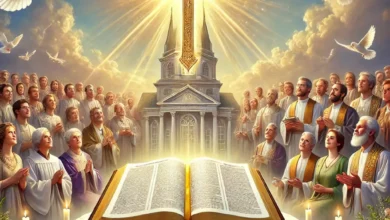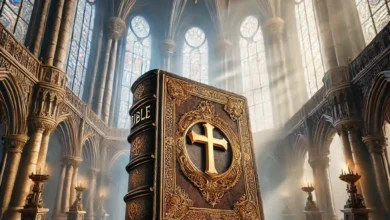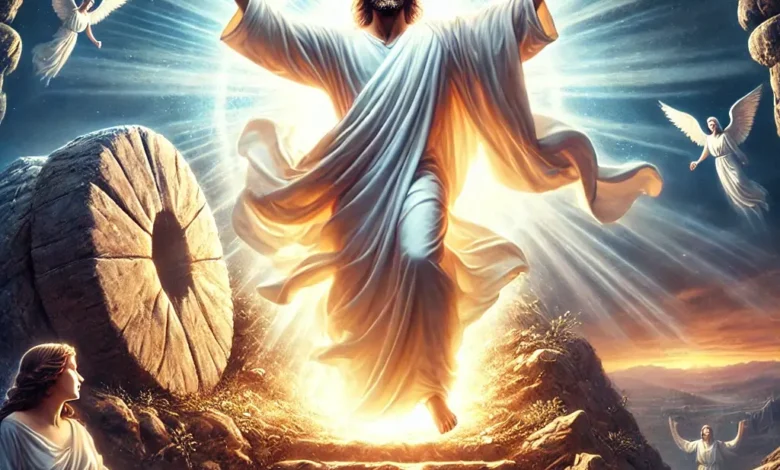
Resurrection of Jesus Christ: History, Influences, and Spiritual Meaning
فرست محتوا
- 1 Resurrection of Jesus Christ: History, Impacts, and Spiritual Meaning
- 1.1 Introduction: The Importance of the Resurrection of Jesus Christ
- 1.2 The History of the Resurrection of Jesus Christ
- 1.3 Events Following the Resurrection of Jesus Christ
- 1.4 What Does the Resurrection of Jesus Christ Mean?
- 1.5 What Happened During the Resurrection of Jesus Christ?
- 1.6 Who Saw Him at the Time of the Resurrection of Jesus Christ?
- 1.7 Spiritual Impacts of the Resurrection
- 1.8 Historical and Cultural Impacts of the Resurrection
- 1.9 Questions and Answers About the Resurrection of Jesus Christ
- 1.10 Table: Categorization of Important Information About the Resurrection
- 1.11 The Role of the Apostles at the Time of the Resurrection of Jesus Christ
- 1.12 The Role of the Resurrection in Strengthening the Faith of the Disciples and the Beginning of the Christian Movement
- 1.13 The Resurrection and the Formation of Early Christian Rituals
- 1.14 Historical Evidence and Scientific Studies of the Resurrection of Jesus Christ
- 1.15 Symbols and Artistic Works Related to the Resurrection
- 1.16 The Role of the Resurrection in the Spread of Early Christianity
- 1.17 The Resurrection and Its Impact on Spiritual Movements in the Modern World
- 1.18 The Impact of the Resurrection on the Establishment of Easter
- 1.19 Psychological and Social Dimensions of the Resurrection of Jesus Christ
- 1.20 The Impacts of the Resurrection on the Transformation of Religions and Philosophy
- 1.21 The Role of Women in Announcing the Resurrection
- 1.22 Conclusion
- 1.23 Recommended External Sources
- 1.24 Common Questions and Answers about the Resurrection of Jesus Christ
- 1.24.1 1. How does the resurrection of Jesus Christ strengthen the concept of divine justice in Christianity?
- 1.24.2 2. How does the resurrection of Jesus affect Christians’ views on suffering and death?
- 1.24.3 3. Do non-Christian sources also refer to the resurrection of Jesus?
- 1.24.4 4. How did the resurrection of Jesus strengthen the leadership role of early Christians in the history of Christianity?
- 1.24.5 5. How did the resurrection of Jesus help change the philosophical outlook of the ancient world?
- 1.24.6 6. How does the resurrection of Jesus impact the concepts of salvation and forgiveness of sins?
- 1.24.7 7. What impact has the resurrection of Jesus had on the faith of Christians during difficult times?
- 1.24.8 8. Does the concept of resurrection exist in other religions?
- 1.24.9 9. How did Easter gradually become the main celebration of the resurrection?
- 1.24.10 10. Are there differences in the accounts of the resurrection of Jesus among the Gospels?
- 1.24.11 11. How does the resurrection of Jesus influence the concept of resurrection in Christianity?
- 1.24.12 12. How is the resurrection of Jesus related to the themes of hope and salvation in Christianity?
- 1.24.13 13. What role does the resurrection of Jesus play in the unity of Christians?
- 1.24.14 14. How is the resurrection of Jesus related to the concept of faith in Christianity?
- 1.24.15 15. How has the resurrection of Jesus been reflected in modern literature and culture?
Resurrection of Jesus Christ: History, Impacts, and Spiritual Meaning
Introduction: The Importance of the Resurrection of Jesus Christ
The resurrection of Jesus Christ is one of the most important and fundamental concepts in Christianity, which not only forms the foundation of the Christian faith but has also had widespread impacts throughout history and in various cultures. According to Christians, the resurrection of Jesus after his death on the cross symbolizes victory over death and sin, opening the way to salvation and eternal life for believers. This event, considering its spiritual and historical significance, is at the center of the Christian message. But how did this resurrection come about, and what effects did it have on the world?
The History of the Resurrection of Jesus Christ
The resurrection of Jesus Christ occurred on the third day after his death, according to the accounts of the four Gospels in the New Testament. Jesus was crucified on Friday, and on Sunday morning, Mary Magdalene and some of his other followers went to his tomb to anoint him, but they found the tomb empty. This moment is recognized as the starting point of the resurrection. The most important sources related to the resurrection of Jesus are the Gospels of Matthew, Mark, Luke, and John, each narrating this event with different details.
Accounts of the Resurrection in the Bible
- Gospel of Matthew (28: 1-10): According to Matthew’s account, Mary Magdalene and another Mary go to Jesus’ tomb and see an angel who tells them that Jesus has risen from the dead.
- Gospel of Mark (16: 1-8): In this account, the women go to Jesus’ tomb and encounter a young man dressed in white who tells them that Jesus has risen from the dead.
- Gospel of Luke (24: 1-12): In this version, the women not only see the empty tomb but also two angels who tell them that Jesus is alive.
- Gospel of John (20: 1-18): Mary Magdalene sees the empty tomb and then mistakes Jesus for the gardener until he calls her name, and she realizes that he is Jesus.
Events Following the Resurrection of Jesus Christ
After the resurrection of Jesus Christ, significant events and actions took place that played a crucial role in spreading the message of Christianity. These actions included Jesus’ repeated appearances to his followers, commissioning the disciples to spread the message of the Gospel, and ultimately his ascension to heaven. The table below lists some of the most important events after the resurrection.
| Event | Description |
|---|---|
| Appearance to Mary Magdalene | Jesus appeared to Mary Magdalene and other women for the first time after the resurrection. |
| Appearance to the Disciples | Jesus appeared to his eleven disciples in a room in Jerusalem and conveyed his message to them. |
| Appearance to Thomas | Jesus appeared to Thomas, who doubted the resurrection, and convinced him. |
| The Great Commission | Jesus commissioned his disciples to go into all the world and spread the message of the Gospel. |
| Ascension to Heaven | Finally, Jesus ascended to heaven from among his disciples, marking the end of his earthly appearances. |
What Does the Resurrection of Jesus Christ Mean?
The resurrection of Jesus Christ means his return to life after death on the cross. This event, which occurred on the third day after his death, is not only a turning point in the faith of Christians but also signifies victory over death and sin. Christians believe that through his resurrection, Jesus provided a way for humanity’s salvation and eternal life. The resurrection of Jesus, as a spiritual event, signifies the fulfillment of God’s promises and affirms the divinity of Christ, which forms the basis of the Christian faith.
What Happened During the Resurrection of Jesus Christ?
On the third day after the crucifixion of Jesus Christ, he rose from the dead, and his tomb was found empty. According to the New Testament accounts, Mary Magdalene and some other women went to Jesus’ tomb to anoint his body, but they encountered a stone rolled away from the entrance and found the tomb empty. Angels announced to them that Jesus had risen from the dead. After that, Jesus appeared alive to some of his followers, and this event was the final confirmation of his message and a sign of victory over death and sin. This event marked the beginning of Christians’ faith in life after death and eternal salvation through Christ.
Who Saw Him at the Time of the Resurrection of Jesus Christ?
According to the accounts in the New Testament, after the resurrection of Jesus Christ, he appeared to several of his followers. The first people to see Jesus were Mary Magdalene and other women who had gone to his tomb. Then Jesus appeared to other followers, including two disciples on the road to Emmaus and also to the disciples in a room in Jerusalem. Specifically, Thomas, who initially doubted the resurrection, believed when Jesus appeared to him and showed him his wounds. These post-resurrection appearances are considered important evidence in affirming the resurrection of Christ in the faith of Christians.
Spiritual Impacts of the Resurrection
The resurrection of Jesus Christ carries an important message of victory over death and sin for Christians. According to Christians, Jesus’ death on the cross is the atonement for humanity’s sins, and his resurrection is a sign of eternal life and salvation from sin. This event is not only at the heart of Christian faith but also holds significance in larger concepts such as resurrection, the return of Christ, and final judgment.
The Meaning of Salvation and Eternal Life
In Christian teachings, the resurrection of Jesus is recognized as a sign of God’s ultimate victory over evil and death. This event gives Christians hope for resurrection and eternal life. As stated in 1 Corinthians 15:20: “But now Christ has risen from the dead and has become the firstfruits of those who have fallen asleep.”
Historical and Cultural Impacts of the Resurrection
The resurrection of Jesus Christ has had significant impacts on history and various cultures. This event not only shaped the core of Christian faith but also led to widespread cultural, artistic, and social transformations. Numerous artistic works from the Middle Ages to the Renaissance have depicted this event in religious art. Alongside art, music and architecture have also been inspired by this event.
Artistic and Architectural Impacts
Throughout history, the resurrection of Jesus has been one of the prominent themes in religious art. From Raphael’s paintings to Michelangelo’s works, this event has been presented as one of the most important religious subjects. In church architecture, the cross and elements related to the resurrection can be seen in the designs of many medieval and Renaissance churches.
Questions and Answers About the Resurrection of Jesus Christ
1. Is the resurrection of Jesus Christ real?
This question has been a topic of debate from the past to the present. Christians believe that the resurrection of Jesus truly occurred, and this event is recognized as their most fundamental belief. However, there are also various historical and scientific perspectives on this issue.
2. Why is the resurrection of Jesus Christ important?
The resurrection of Jesus signifies his victory over death and sin and gives Christians hope for eternal life. This event forms the basis of the Christian faith.
3. What evidence exists for the resurrection of Jesus?
The New Testament Gospels are the most important written sources about the resurrection. These books detail the resurrection event extensively. Early historians like Josephus also referenced this event.
Table: Categorization of Important Information About the Resurrection
| Event | Details |
|---|---|
| Date of Resurrection | Sunday after the death of Jesus (the third day) |
| First Witnesses | Mary Magdalene and other women |
| Main Source | The New Testament Gospels |
| Spiritual Message | Victory over death and sin |
| Historical Impact | Shaping Christianity and religious art and culture |
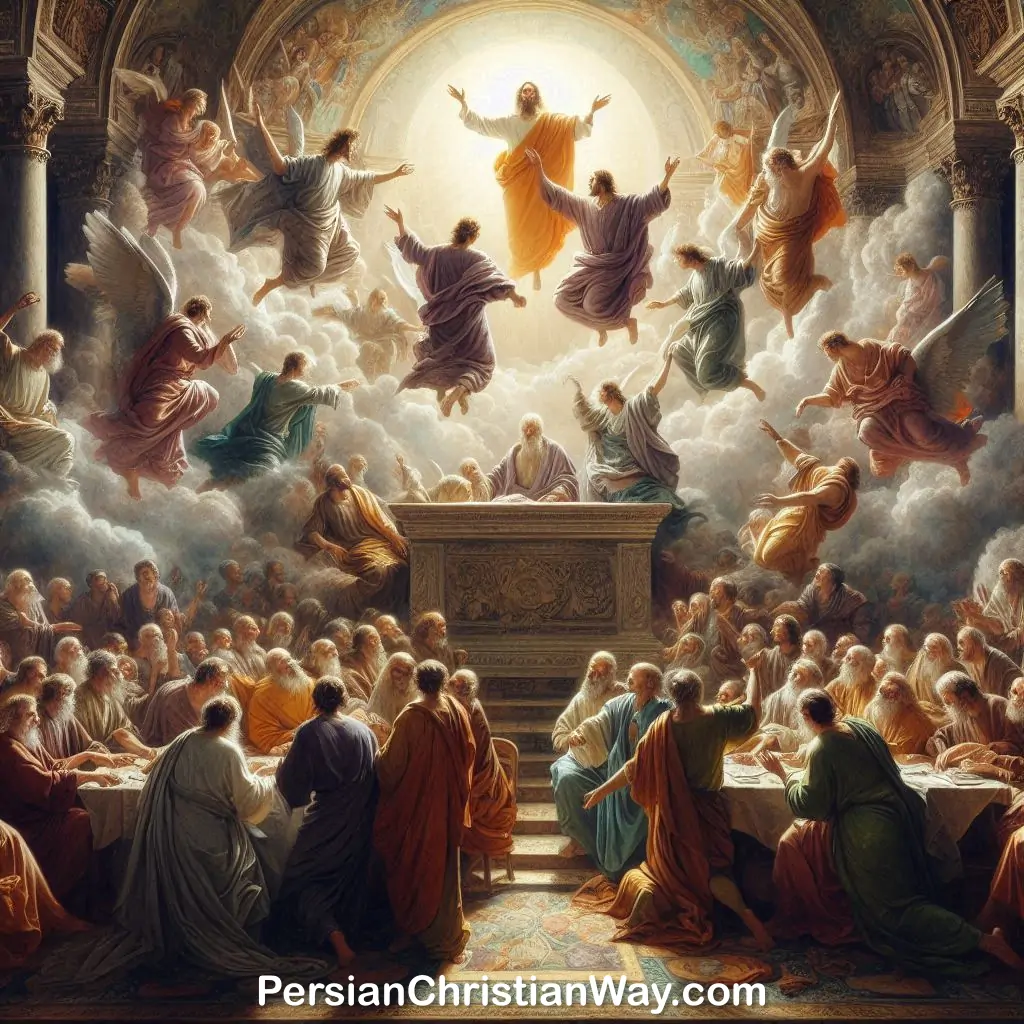 The Ascension of Jesus Christ in a heavenly gathering with the presence of angels and apostles
The Ascension of Jesus Christ in a heavenly gathering with the presence of angels and apostles The Role of the Apostles at the Time of the Resurrection of Jesus Christ
The apostles, as the close disciples of Jesus Christ, played a fundamental role in conveying the message of the resurrection. At the time of the resurrection, these individuals faced fear and doubt. Many of them initially struggled to believe in the resurrection. Therefore, Jesus’ presence after the resurrection and his multiple encounters with the apostles strengthened their faith to continue their mission.
Thomas’ Doubt
Thomas, one of the twelve apostles of Jesus, doubted this event due to his absence at the first meeting with Jesus after the resurrection. He did not believe in the resurrection until he personally saw Jesus and touched his wounds. This story is presented as a key moment in the history of Christianity in affirming faith after the resurrection.
The Great Commission
After the resurrection, Jesus called his apostles and commissioned them to spread his message throughout the world. This mission, known as the “Great Commission,” is considered one of the most important duties of the apostles after the resurrection. Jesus told his disciples to go and baptize all nations and teach them to observe all that he had commanded.
Strengthening Unity Among the Apostles
Before the resurrection, there were rivalries among some of the apostles for superiority and position. However, after the resurrection and Jesus’ repeated encounters with them, these rivalries diminished, and they all continued their mission with greater unity. The resurrection of Jesus played an important role in strengthening this unity.
The Role of the Resurrection in Strengthening the Faith of the Disciples and the Beginning of the Christian Movement
One of the greatest impacts of the resurrection of Jesus Christ was the strengthening of the faith of his disciples. Before the resurrection, many of Jesus’ followers were filled with fear and despair after his death on the cross. However, after encountering the risen Jesus, the disciples preached his message with greater confidence and power. This trust in the message of the resurrection enabled the disciples to stand courageously against persecutions and spread the message of the Gospel throughout the world.
Jesus’ Appearance in Galilee
One of the lesser-known accounts after the resurrection is Jesus’ appearance to the disciples in Galilee. In this event, Jesus showed them that he still held spiritual leadership over them and confirmed their global mission. This meeting took place on the shore of the Sea of Galilee and was accompanied by another miracle, the catching of a large number of fish by the disciples, reminding them that they still had a great mission ahead.
The Impact of the Resurrection on Jews and Other Groups
The resurrection of Jesus Christ not only affected his disciples and followers but also led many Jews and even followers of other religions to embrace Christianity. This event was interpreted as a sign of the fulfillment of divine promises in the Torah and a sign of ultimate salvation. Additionally, those who converted from other religions to Christianity accepted the resurrection as a testimony to divine power and the truth of the Christian message.
The Resurrection and the Formation of Early Christian Rituals
One of the significant consequences of the resurrection of Jesus was the establishment of early worship rituals in the Christian community. After the resurrection, Jesus’ disciples instituted the Eucharist as a memorial of his sacrifice and resurrection. This ritual not only played a role in strengthening the individual faith of believers but also helped create social and religious solidarity in the early Christian community.
The Connection of the Resurrection with the Concept of the “Kingdom of God”
The resurrection of Jesus Christ can be seen as a foreshadowing of the ultimate realization of the “Kingdom of God” on earth. This concept, which was frequently mentioned in Jesus’ teachings, gained more power with his resurrection and assured his followers that one day this kingdom would be fully established. The resurrection is considered the first stage of this divine kingdom and gives Christians hope for the return of Jesus in the future.
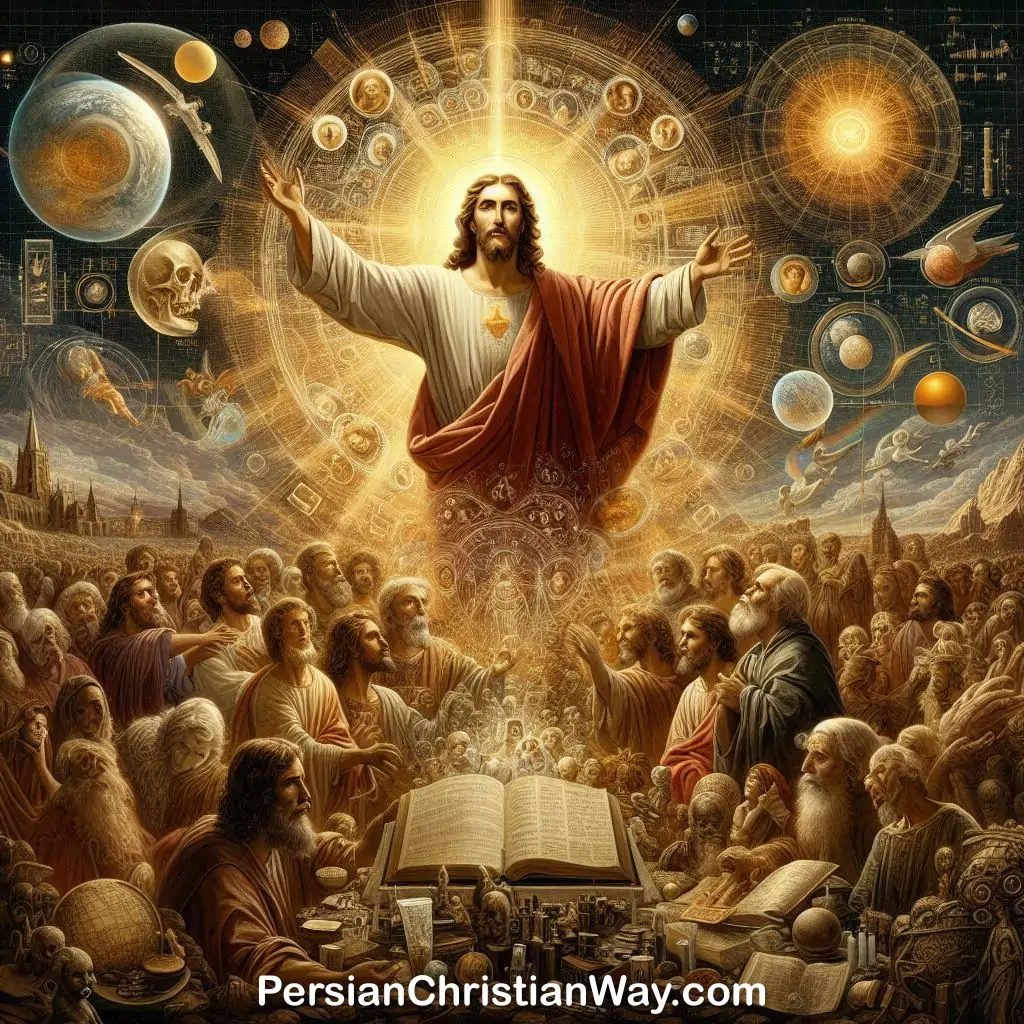 Jesus Christ with cosmic symbols and a crowd of followers
Jesus Christ with cosmic symbols and a crowd of followers Historical Evidence and Scientific Studies of the Resurrection of Jesus Christ
Although the resurrection of Jesus Christ is one of the fundamental beliefs of Christianity, some researchers and historians have attempted to examine this event from a scientific and historical perspective. Among the issues that have drawn researchers’ attention are archaeological evidence and non-religious texts that refer to the resurrection event.
Evidence from Early Historians’ Perspectives
- Flavius Josephus: One of the most important Jewish historians who lived in the first century AD, he referred to Jesus and his followers. In his book “Antiquities of the Jews,” he mentions the impacts of Jesus on the people and also refers to the events related to his crucifixion and resurrection.
- Tacitus: Tacitus, a Roman historian, also referred to the events related to Jesus and the resurrection and examined the role of this event in the spread of Christianity in the Roman Empire.
- Pliny the Younger: He mentions in his writings the followers of Christ and the impacts of the resurrection on their behavior and beliefs, highlighting the role of this event in the expansion of the Christian community.
Less Known Historical Quotes and Evidence about the Resurrection of Jesus Christ
In addition to the well-known sources of Josephus and Tacitus, other lesser-known historical evidence also refers to the resurrection of Jesus Christ. One of these sources is the writings of Mara bar-Serapion, a Syrian philosopher. In a letter to his son, he refers to the fate of Jesus as the “king of the wise” and mentions the consequences of his death for his followers, indicating the significance of this event even outside Christian communities.
Additionally, Lucian of Samosata, a Greek writer and satirist, despite his critical approach to religions, referred to Jesus and his followers in his works and spoke of their efforts to maintain belief in the resurrection and salvation. Although these sources are not as well-known as Josephus and Tacitus, they still provide important evidence for the historical examination of the resurrection of Jesus Christ.
Alongside these sources, archaeological findings have also confirmed some locations related to the resurrection story. Although there is no direct material evidence of the resurrection event, remains related to ancient tombs and new analyses of the geographical locations of the events have added new dimensions to the historical examination of the resurrection.
Scientific Research on the Resurrection
Scientific and archaeological research in recent centuries has attempted to find material evidence for the events mentioned in the Bible. One of the important topics is the study of Jesus’ empty tomb and the investigations conducted on crosses that have survived since ancient times. Although definitive scientific proof of the resurrection is not possible, some recent studies on the geographical location and remains from the time of Christ indicate the validity of some historical accounts.
Symbols and Artistic Works Related to the Resurrection
The resurrection of Jesus has been a source of inspiration for artists and writers throughout history. Among the symbols that are consistently used in Christian art are the cross, the crown of thorns, and the image of the empty tomb. These symbols can be seen not only in paintings and sculptures but also in the architecture and design of churches.
| Symbol | Meaning | Impact on Art |
|---|---|---|
| Cross | Symbol of sacrifice and atonement | Presence in church architecture, religious paintings, and jewelry |
| Crown of Thorns | Symbol of suffering and the sacrifice of Jesus | Prominent role in Renaissance paintings and religious sculptures |
| Empty Tomb | Symbol of resurrection and victory over death | Displayed in many artistic works and stained glass windows of churches |
Notable Examples in Artistic Works
- Painting “The Resurrection” by Michelangelo: This magnificent artwork depicts the resurrection of Jesus with precise details and strong emotions.
- Sculpture “The Risen Christ”: In St. Peter’s Basilica, this sculpture beautifully showcases a scene from the moment of resurrection.
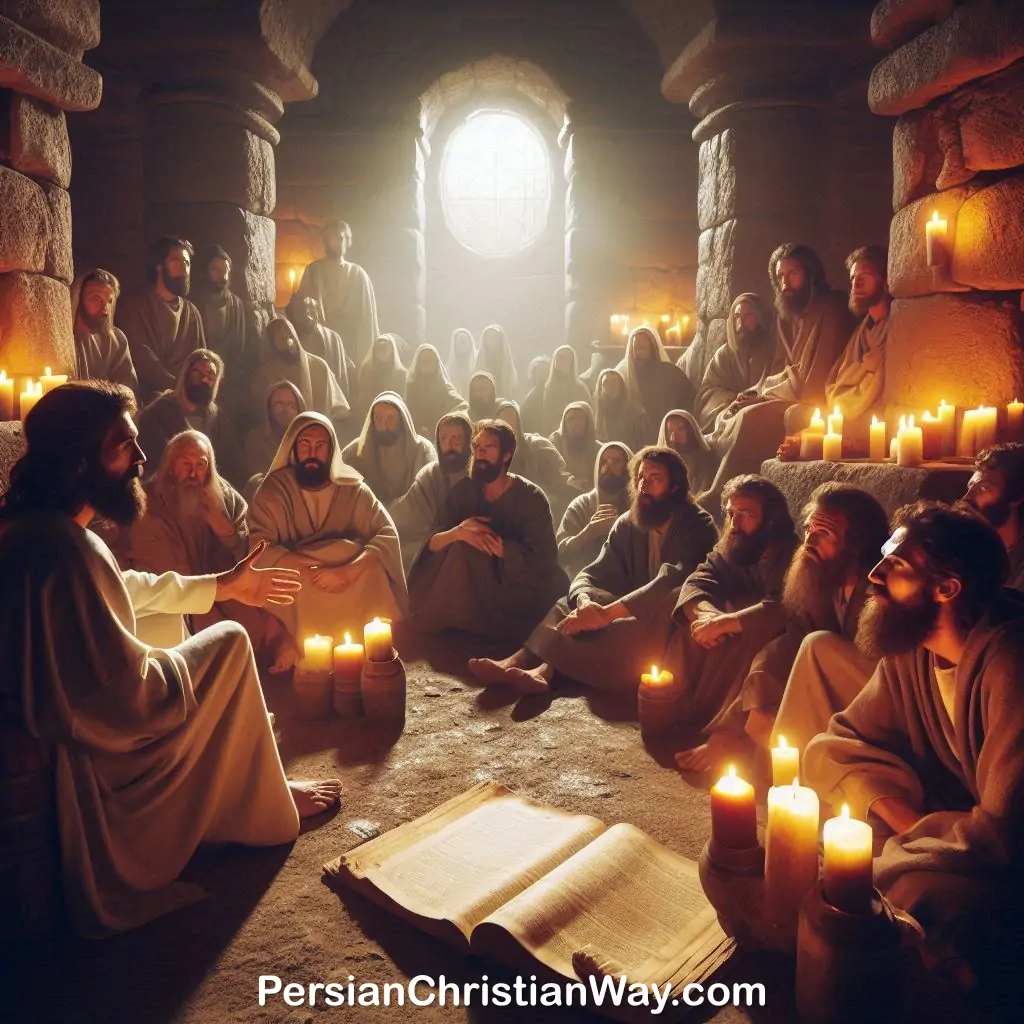 Jesus teaching the disciples in a stone setting with candlelight
Jesus teaching the disciples in a stone setting with candlelight The Role of the Resurrection in the Spread of Early Christianity
The resurrection of Jesus Christ played a very important role in the early spread of Christianity. This event gave the early followers of Jesus more motivation and confidence to spread his message throughout the world. Additionally, the resurrection served as a powerful sign of the fulfillment of God’s promises in the New Testament, encouraging believers to face severe opposition and triumph over challenges. For this reason, the first Christian churches were established based on the testimonies of those who had seen Jesus after the resurrection, and these testimonies formed a solid foundation for their faith.
Historical Evidence of the Rapid Growth of Christianity
The rapid growth of Christianity in the first century AD, according to evidence from historical sources and Jewish and Roman texts, is one of the most significant consequences of the resurrection of Jesus. According to historians like Josephus and Tacitus, the followers of Jesus quickly spread throughout the Roman Empire and disseminated his message through preaching and teaching. This rapid expansion indicates the profound impact of the resurrection on the societies of that time.
The Resurrection and Its Impact on Spiritual Movements in the Modern World
In the modern world, the resurrection of Jesus Christ continues to serve as a source of inspiration for spiritual movements and new Christian movements. Many modern spiritual and Christian movements are founded on this fundamental event and present the message of resurrection and victory over death as their core concepts. These movements believe that the resurrection was not just a historical event but that its spiritual message remains at the heart of the spiritual and religious lives of people around the world.
The Resurrection and Its Reflection in Contemporary Literature and Philosophy
In addition to its religious impacts, the resurrection of Jesus has become an intriguing topic for writers and philosophers in contemporary literature and philosophy. Modern literary works such as “The Da Vinci Code” by Dan Brown or “The Cross and the Resurrection” by Tom Wright focus on the concept of resurrection and its impact on societies and human values. Additionally, philosophers like Paul Tillich and Søren Kierkegaard have explored the concept of resurrection from an existentialist perspective and its impact on the meaning of life.
The Impact of the Resurrection on the Establishment of Easter
The resurrection of Jesus Christ is not only an important event in the history of Christianity but also forms the foundation of the Easter celebration. Easter is one of the largest religious holidays for Christians, celebrated annually in commemoration of the resurrection of Christ. This celebration is accompanied by special rituals and plays an important role in strengthening the unity and identity of the Christian community. In many cultures, Easter symbolizes renewal and rebirth, and the ceremonies of this day are usually celebrated with communal activities, religious music, and participation in worship services.
Rituals Related to Easter
Important rituals of Easter include the Eucharist, special prayers, and worship services. Additionally, in many countries, the tradition of decorating Easter eggs and exchanging gifts during this time is common. These rituals reflect the special significance of this celebration in various Christian cultures and echo the importance of the resurrection in the faith and daily lives of Christians.
Psychological and Social Dimensions of the Resurrection of Jesus Christ
One of the less considered aspects of the resurrection discussion is the psychological and social impacts of this event on the early followers of Christ and the societies of that time. The resurrection of Jesus Christ, in addition to its religious meaning, provided his followers with a sense of power, hope, and social cohesion that strengthened the early Christian community. After the resurrection, the followers of Jesus preached his message with greater confidence, which helped the rapid spread of Christianity throughout the Roman Empire.
The Impacts of the Resurrection on the Transformation of Religions and Philosophy
The resurrection of Jesus Christ also influenced other religions and philosophies of that time. Many philosophical movements, such as Neoplatonism, drew inspiration from this event and examined the concepts of death and life. This interaction between philosophy and religion played a significant role in shaping religious and philosophical thoughts in later centuries.
The Role of Women in Announcing the Resurrection
Another fascinating aspect of this event is the role of women in the first announcement of the resurrection. While in many ancient societies, women had a lesser role in religious matters, in the resurrection story, women were the first to witness the empty tomb and the message of the resurrection. This aspect of the story has attracted the attention of feminist researchers and modern historians, as it highlights the role given to women in the early Christian movements.
Conclusion
The resurrection of Jesus Christ is not only a historical event that has had many impacts throughout history but also serves as a pivotal point of faith for Christians. This event conveys the message of salvation and eternal life to believers and is recognized as one of the most important religious events in the world. The role of this event in history, culture, and art shows that its impact remains in the lives of people to this day.
Recommended External Sources
Common Questions and Answers about the Resurrection of Jesus Christ
1. How does the resurrection of Jesus Christ strengthen the concept of divine justice in Christianity?
The resurrection of Jesus Christ shows Christians that divine justice ultimately prevails. Through Jesus’ death and resurrection, God demonstrated that sin and death cannot triumph permanently, and ultimately divine justice will be fully realized.
2. How does the resurrection of Jesus affect Christians’ views on suffering and death?
The resurrection of Jesus Christ shows Christians that death is not the end. This event gives them hope that after suffering and death, eternal life awaits, and the sufferings they experience in this world are temporary and part of a larger plan.
3. Do non-Christian sources also refer to the resurrection of Jesus?
Some non-Christian historical sources, such as the writings of Josephus, a Jewish historian, and Tacitus, a Roman historian, refer to the resurrection of Jesus. Although these sources address this topic in a limited way, they confirm the existence of Jesus and his impact on his followers.
4. How did the resurrection of Jesus strengthen the leadership role of early Christians in the history of Christianity?
The resurrection of Jesus showed his followers that he was not only a prophet but also the Son of God and the Savior. This belief empowered and legitimized the early church leaders to preach his message with greater courage and confidence and to establish the church as a global religious institution.
5. How did the resurrection of Jesus help change the philosophical outlook of the ancient world?
The resurrection of Jesus helped change humanity’s perspective on death and life after death. This event influenced philosophical thoughts and led many philosophers and thinkers to take the concept of life after death and resurrection more seriously.
6. How does the resurrection of Jesus impact the concepts of salvation and forgiveness of sins?
The resurrection of Jesus serves as a confirmation of the ultimate victory over sin and death, strengthening the concept of divine forgiveness in Christianity. Christians believe that through the resurrection of Jesus, the sins of humanity are forgiven, and a path to salvation and eternal life is opened.
7. What impact has the resurrection of Jesus had on the faith of Christians during difficult times?
The resurrection of Jesus Christ has provided hope and resilience to Christians during difficult times such as wars, diseases, and persecutions. This faith in the ultimate victory over death and suffering motivates them to face life’s challenges.
8. Does the concept of resurrection exist in other religions?
Yes, the concept of resurrection exists in some other religions, such as Islam. However, in Christianity, the resurrection of Jesus Christ plays a central role as a historical and divine event in faith, while in other religions, this concept may have more spiritual aspects.
9. How did Easter gradually become the main celebration of the resurrection?
Easter gradually became the main celebration of the resurrection because early Christians believed that the resurrection of Jesus symbolized the ultimate victory over death. This celebration initially took shape in early Christian communities and gained a special place in church calendars over time.
10. Are there differences in the accounts of the resurrection of Jesus among the Gospels?
The Gospel accounts of the resurrection of Jesus differ in some details, but they all agree that Jesus rose from the dead and appeared to his followers. These differences are attributed to the diversity of perspectives and experiences of the disciples.
11. How does the resurrection of Jesus influence the concept of resurrection in Christianity?
The resurrection of Jesus Christ is considered an example of the resurrection of humanity on the Day of Judgment. Christians believe that just as Jesus rose from the dead, they too will be resurrected on the Day of Judgment and will live in the presence of God.
The resurrection of Jesus conveys a message of hope for salvation and eternal life to Christians. This event, as the pinnacle of Christian faith, signifies that life after death exists and that God is faithful to his promises.
13. What role does the resurrection of Jesus play in the unity of Christians?
The resurrection of Jesus, as a central event in Christian faith, plays an important role in strengthening unity among Christians. This shared belief allows Christians from different denominations to agree on the fundamental principles of their faith and act as a united community.
The resurrection of Jesus Christ signifies the fulfillment of God’s promises and the divine nature of Christ. This event serves as the foundation of Christians’ faith and assures them that their faith in God and salvation through Christ is justified and true.
15. How has the resurrection of Jesus been reflected in modern literature and culture?
The resurrection of Jesus has been reflected as one of the most important historical and religious events in modern literature, films, and music. Numerous works by writers and artists have explored the meaning of the resurrection and its impacts on society and culture.


